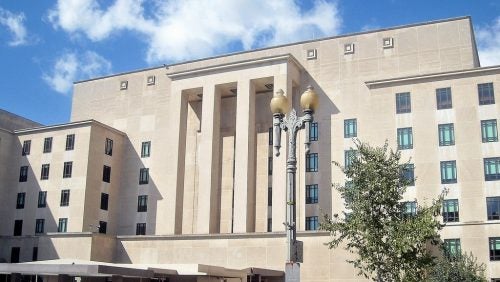Deleting Data: Part of Trump’s FY 2021 Refugee Policy?
October 16, 2020 by Digital Editor

U.S. State Department Headquarters
By: Serena Seaman
Six days before releasing the President’s Report to Congress on the Proposed Refugee Admissions for Fiscal Year 2021 the State Department released a media note regarding the Department’s Bureau of Population, Refugees and Migration’s Refugee Processing Center (RPC) website. The note, titled “Migration of Refugee Case Processing System,” announced that decades of data on refugee resettlement would no longer be publicly available after October 9, 2020. Removing this data prevents policymakers and the American public from making informed judgements regarding the Government’s refugee policy.
While reports providing basic current-year data on refugee arrivals will remain available, the information being removed by the Department of State provides the context required to understand refugee policy in an accessible and easily searchable format. For example, the RPC’s report on the ethnic and religious makeup of refugees allowed into the country (“Arrivals by Nationality and Religion”) will no longer be provided. The ethnic and religious groups captured in this report include many not commonly thought of as refugees, including Iranian Jews (72 admitted in 2016), Baptists from Burma (486 in 2016), and Congolese Methodists (1,097 in 2016). For groups like these, whose stories do not show up in national newspapers, removing these reports is tantamount to removing them from the public record.
The removed reports include effectively all of those that present cumulative historical data. The limited historical information that will remain will be held in separate annual reports and will include only basic data points such as continent of origin, representing a significant decrease in both data availability and accessibility. The removal of historical data is potentially even more significant than the loss of detail discussed above given the Administration’s changes to this longstanding policy. The proposed FY 2021 cap on refugee admissions to the United States is set at 15,000, a decrease of over 82% from FY 2016 and over 77% from 1986, the lowest cap prior to the Trump administration. The context provided by the removed historical data is essential for understanding current refugee policy; for example, evaluating the impact of allowing 512 Arabic-speaking refugees into the US in FY 2020 (from the removed “Top Ten Refugee Native Languages” report) without the knowledge that 21,527 were admitted in FY 2016 significantly undermines any meaningful analysis. The importance of the RPC data extends to local politics: a Minnesota resident is more equipped to estimate the FY 2020 community impact of 386 refugees (per the removed “Interactive Map: Arrivals by State and Nationality”) when they can see that 2,635 were absorbed in FY 2016.
Context is everything in refugee policy. When a refugee report ceases to report on a group, from an administrative perspective, that group ceases to exist. In 2020, there were zero Iranian Jews admitted. Without having access to data that shows that a significant number of Iranian Jews were admitted in previous years, this refugee category will be eliminated. This removal of records, however, does not mean that the conflict that created the refugee group has been resolved. Similarly, the removal of historical data makes it impossible to accurately judge the potential impact of numbers (like the 15,000 FY 2021 cap or even the 386 arrivals in Minnesota in FY 2020) that seem large but are significant decreases from past years. And it is not only the data-obsessed nerds writing law blogs that will notice the removal of the RPC reports. This data is heavily cited by think-tanks, scholarly publications, institutes, and global news sources: when your local newspaper writes about refugees, these are the sources it cites and relies on. Their removal, which will have been completed by the time this blog is published, is the removal of the unbiased fact sets that journalism and society depend on.
Serena Seaman is a second-year law student at Georgetown. Prior to law school, she worked as a paralegal at the global corporate immigration law firm Fragomen, Del Rey, Bernsen & Loewy, LLP. She has pro bono experience working on refugee cases and founded the refugee mentoring club at her undergraduate college, where she majored in International Studies. She serves as the Treasurer of the Georgetown International Arbitration Society and is also a staff editor for the Georgetown Journal of International Law.

